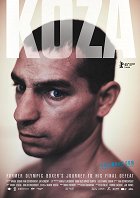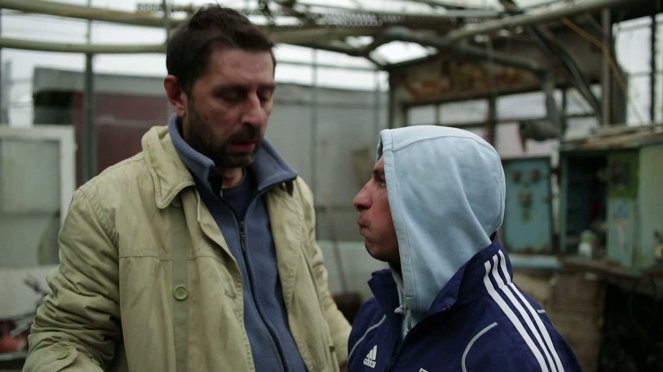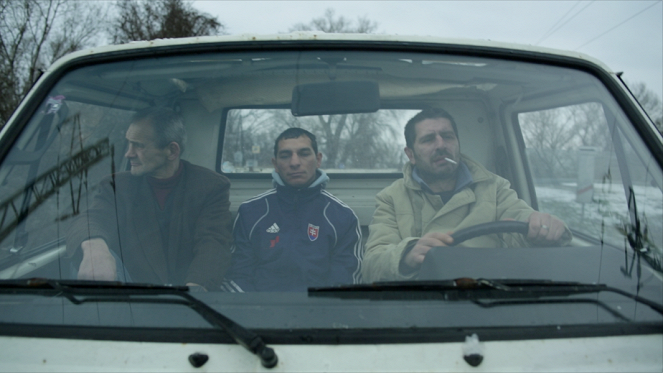Regie:
Ivan OstrochovskýKamera:
Martin KollárBesetzung:
Peter "Koza" Baláž, Zvonko Lakčevič, Ján Franek, Stanislava Bongilajová, Nikola Bongilajová, Tatiana PiussiInhalte(1)
They call him Koza, the goat. His best days as a boxer are behind him. Sometimes he re-watches the video of his fight at the 1996 Olympics. Now he needs money because his girlfriend is pregnant. That's why he decides to return to the ring. His boss, for whom he otherwise collects scrap metal, accompanies him on this tour as a kind of boxing impresario – a tour that is sadly more of an ordeal than a triumph. Koza's body is barely up to the training and he loses most of his fights in the first round. Unlike life, however, the film shows mercy to its protagonist. In this melancholy road movie, the camera focuses less on the boxing matches than on the unglamorous action backstage. Drives through wintry landscapes, days on which it never really gets light and when the cola in the car freezes in the bottle, the inglorious end to the fights – the film shows all of this in exquisitely framed images, which gift the anti-hero another space than that of the boxing ring. Slovakian boxer Peter Baláž, who plays himself here, was a brilliant find for the film and easily stands comparison with other boxing film heroes. (Berlinale)
(mehr)Videos (1)
Kritiken (5)
Ein gespielter Film über reale Menschen, die sich selbst spielen. Und das ist gut – die Bildkompositionen wären für einen Dokumentarfilm zu schade. Ein brillanter Kontrast von einer Lebensstümperei vor der Kamera und einem Filmemacher-Talent hinter der Kamera, ohne dass der zweiten Gruppe die erste gleichgültig wäre. Ostrochovský hat ein Gefühl für das Bild (jede Außenszene ist eine Perle), für die Schauspielaction (die Szene mit dem Lutscher ist toll) sowie den Schnitt (das prima Ende). Die Hauptfigur macht das Publikum zuerst neugierig, allmählich gewinnt sie seine Sympathien und zum Schluss bemitleidet man sie. Die gefühlvolleren Szenen sind aber absichtlich kürzer, sie übermitteln nur schnell die Information. Das Sentiment würde hier nämlich im Wiederspruch zu dem Erlebnis stehen, welches das Intellekt stimulieren soll.
()
Souveräne Kameraführung, jedoch insgesamt verlegen. Leider befinden sich die schauspielerischen Leistungen im Film Koza auf einem Level, bei dem mit der Figur fast nichts zu machen ist, außer mit ihr lediglich passiv zu manipulieren. Somit wirkt der Roma-Boxer eindeutig als bedauerliches Objekt, mit welchem seine Freundin, ein zwielichtiger Manager, ein alkoholisierter Trainer und auch der Regisseur hin und herschwingen. Dieses Fliegengewicht bemüht sich nur allzu sehr und in jeder Hinsicht auf den Füßen zu bleiben, fällt jedoch immer in die erste Runde. Die Frage besteht darin, ob diese seltsame deprimierende Hybridmischung an dokumentarischem und sozialem Drama nicht ein wenig einseitig und passé ist. Koza hat mich selbst im geringsten Bereich nicht in den Bann gezogen, auch nicht überzeugt, er hat mich nirgendwohin bewegt. Dabei ist doch mit ihm in vielerlei Hinsicht alles in Ordnung. Aber als Film sieht das ganze einfach leer aus. Als bester Moment bleibt hier das saftige Cameo des Hühnermeisters Frank hängen, welcher der Erzählung als einziger etwas Dynamik verleiht. Alles andere im Film wirkt lethargisch - jedoch nicht auf besonders anregende Weise. #kviff
()
The restrained camerawork serves as a safeguard against the kind of exploitation of poverty that the makers of other social dramas indulge in. Furthermore, the images of destitution in which Goat lives are never underscored with histrionic music. Besides terse lines like “Don’t chew, eat”, we hear only the amplified sounds of the setting. The best thing is that the reluctance to make an impressive spectacle out of the story of a boxer returning to the ring is apparent in the filming of the matches as whole images, with the camera positioned far from the boxers. Unlike films such as Raging Bull, in which we find ourselves directly in the ring, here the camera passively remains standing at a distance, without gradually approaching the boxers. ___ Sometimes more attention is paid to the spectators, who obviously live in better conditions than Goat, than to the match itself. This involves another departure from the conventions of boxing dramas. The body here is not a continuously perfected fighting machine, but an object of exploitation worth a few hundred euros. Self-destruction for other people’s money is framed as an activity with as little dignity as collecting old iron waste, thus indirectly underscoring Goats social exclusion. His isolation, apparent also in the fact that we usually see him alone in the given shot, is intensified in a different language setting. He can barely count to five in English, let alone carry on a meaningful conversation. ___ Unlike in The Way Out, Goat does not fight against the system and his Romani origin is not directly thematised. He is out of sync with the rest of society and the world of boxing. He lacks the strength, cunning and ruthlessness of others. Thanks to that, this is an existential story of a man who has somehow learned to survive in the given conditions (for example, by collecting and selling iron), but at the same time has been out of training for so long that he has no chance to catch up with the world around him. He is always a few metres behind: more than once we see him running after a moving car, once he misses a ferry and has to wait for the next one.___ The illusion that we are watching real, non-staged situations is only occasionally broken by scenes in which Baláž tries to convey what the screenplay prescribes. His inability to embody the prescribed role reveals the limits of the method of blurring the line between documentary and fictional films. Ostrochovský, however, was apparently aware of Baláž’s limitations as an actor and instead lets the images do as much of the talking as possible. ___ As intentionally monotonous as the “match-car ride/training-fight” structure is (as is the boxing itself), Goat manages to hold the viewer’s attention by revealing information from the protagonist’s past at approximately ten-minute intervals and pointing out Baláž’s continuously deteriorating health. The protagonist is not introduced by his titular nickname until nearly half an hour into the film, when he laconically utters, “They call me Goat.” From terse conversations, we similarly learn only gradually and seemingly inadvertently that Nikolka is Goat’s stepdaughter (and he would therefore like to have a child of his own) and that he was raised by his grandmother who fed him goat’s milk (from which he got his nickname). At the same time, however, the compact structure doesn’t cause the film to seem like a carefully shaped construct that is merely fulfilling a preconceived plan. The situations correspond to the characterisation of the characters and arise naturally from external conditions, which is also aided by the presence of seemingly random events that are not further elaborated upon in the narrative (the ride and robbery of the hitchhiker). ___ Goat is a film of satisfying stylistic purity that doesn’t venture into uncharted territory and is not breathtaking in its message or execution, but without exaggeration, it can be measured against the festival films of other European countries, which in the end is the greatest victory for both Goat the film and (for a long time) Goat the boxer. 65%
()
(weniger)
(mehr)
Sometimes life is just too fucked up and it doesn't matter if you are a former Olympian who didn't do much at the Olympics but won what you could domestically, or an ordinary person. I liked the rawness of the film, but I wondered quite often how much of the scenes were staged, so I certainly wouldn't see it as a documentary.
()
There is something about Goat. He needs to make money, is a former boxer who thinks that he can get a euro here and there without being fit and having muscles. The director tells the story about real characters in a documentary-like way, which is in and of itself original. Also, thanks to this, you can feel the movie is very realistic. Plus, I have to praise the qualities of the cameraman, who turned an ordinary journey to the west into a journey of self-discovery with a hen in a box.
()



Werbung